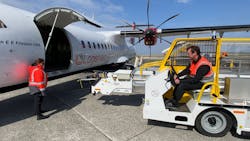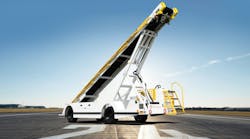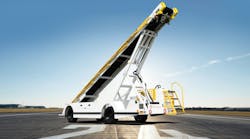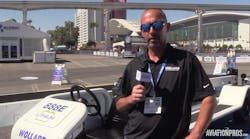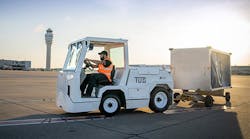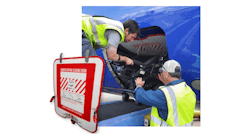Loganair is now the UK's largest regional airline with more than 40 aircraft serving 44 destinations in the UK, the Isle of Man, Ireland and Europe. The airline had the busiest summer ever in 2022, carrying a record number of passengers.
At the beginning of 2022, Loganair secured a new five-year contract with Royal Mail to continue flying mail and parcels to and from the Highlands and Islands, connecting to Royal Mail’s national network each day and night. To cope with the continued increase in volumes four larger ATR72-500 freighter aircraft have been introduced with another on order to replace the Saab 340 freighters. The older Saab aircraft are being retired, not only to better support the new contract, but also as part of wider fleet renewal plans which belong to the company´s GreenSkies Initiative. The airline operates its own ground handling in the Highlands and Islands.
Consequently, Loganair has taken action to modernize its ground equipment fleet with smarter and greener GSE. The airline introduced Power Stow Rollertrack Conveyors to optimize and speed up the handling process, provide better working conditions for ramp agents and change to electric belt loaders. The Rollertrack extendable belt loaders are supporting Loganair;s operations at six stations: Aberdeen, Benbecula, Inverness, Kirkwall, Stornoway and Sumburgh.
Maurice Boyle, chief operations officer for Loganair, says: “With the Power Stow units, we are seeing a big reduction in delays with the bulk loaded aircraft compared to when we were manual handling using conventional belt loaders. The investment is saving us time, saving on labor and it does exactly what it's meant to do. The mail loaded aircraft are hard work to load and unload manually. The ATR carries double what a Saab carries and the distances in the hold are much greater. The handlers absolutely love the Power Stow product, it´s made their job easier, there is less risk of back injuries and there are several other human factor benefits as well. There is no downside to the product. The operators´ feedback are really good and they particularly like the silent and fume free equipment.”
Smart GSE for Faster Turnaround
The new contract with Royal Mail meant more weight and volume, which the new ATR aircraft can accommodate, but the airline had to look for ways to optimise the turnaround as the turnaround time remained the same. The way they did it was to get smarter on equipment and also going green.
“Loganair has been flying for Royal Mail since commenced operations 60 years ago. For today, the carriage of the traditional mail, such as letters has declined, but carriage of Amazon packages has increased, and it has formed a lifeline for people in these remote communities. They can buy products online and receive them the next day. Similarly, there are a lot of entrepreneurial companies on these islands producing jewellery and food products which they can market faster as well.
The aircraft has doubled in size, but the turn times had to be respected. When the planes get to these islands, the trucks that are getting loaded need to catch ferries to other islands. Therefore, we had to find the means of working faster and smarter and that´s exactly what the Rollertrack does,” says Boyle.
Dependable Product and Enhanced Working Conditions
The airline did a thorough commercial evaluation on the product to justify the investment and the total cost of ownership.
“The Power Stow product was evaluated as better engineered than similar products on the market. The investment is significant, but we strongly believe that the total cost of ownership over the lifetime will be low.
The product is compact, both the chassis it is mounted on and the mechanism for going into the aircraft. Further to that, Power Stow´s extendable belt loader is able to go in the aft door of an ATR aircraft, so we can also load cargo in the rear sections. It´s the ideal product for the aircraft and the engineering quality is very high. The conversations from users in the industry and the fact that the first unit, which was introduced to the market 20 years ago, is still in service in Copenhagen (sure components were replaced over the lifetime) gives you an idea about the quality. We need dependable GSE, as getting support on these remote islands takes a couple of days, so having a dependable product is vital. The staff morale has improved as manually handling up to 5 tons of bulky boxes on and off was quite time-consuming, repetitive, and an unattractive job. Just stacking them now since introducing the Rollertrack is much easier and faster. We also eliminate the risk of potential damage,” says Boyle.
The airline intends to get more ATR aircraft in the future and expand into the overnight express and regional cargo market. They want to be a serious player in the regional cargo market. “And to do that we have to be a good cargo ground handler and we have to have the right ground equipment to support the fleet,” he adds.
Going Electric and Reducing Noise
Electrification was high on Loganair's priority during the evaluation process. The option of electrical power opposed to diesel engines was a big advantage. Even though the charging infrastructure was not available at that time, Loganair pushed the airports to install these in order to proceed with their green policy. Royal Mail is also highly health and safety focused, therefore avoiding fumes and having clean energy was an absolute must.
Boyle adds that: “Noise reduction is an important issue as well. Loganair also switched to battery power units because of the pollution and noise. With the electric belt loaders, the total noise reduction is significant.”
Innovative Technology for Optimized Teams
Just like for others in the industry the lack of personnel and recruiting workforce has also been a challenge for Loganair, especially on some of the remote locations. On the island locations there is a core number of staff every day to handle the passenger flights, but getting additional staff for a couple of hours when the mail plane arrives is challenging. Therefore, one of the reasons Loganair invested in Rollertrack Conveyors was that they couldn´t get the labour to cover the turns efficiently.
“It is always difficult to recruit staff in some of these small island communities. A lot of people have 2-3 jobs, and they might also be working in farming. We try to accommodate that as their operations are quite peaky. But like all airport jobs it is not as attractive as it used to be, even though the staff on the islands get benefits, such as discounted flight prices. And in the UK there is an added complexity because of Brexit. In mainstream airports this is an even bigger problem, as they are struggling with finding people to work on the ramp. Finding ways to efficiently load an aircraft with less people is key,” says Boyle.
